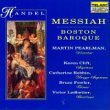CHORUSAnd the glory of the Lord shall be revealed. And all flesh shall see it together, The orchestra introduces the chorus’s opening theme, which consists of two musical phrases presenting the first sentence of text. The chorus alto section is the first to report the “glory of the Lord.” The full chorus echoes, then the musical phrases are separated, and each becomes the object of various treatments in one or two voices at a time. [Excerpt 7] It takes a while for the glory of God to appear in its entirety in the combined chorus and orchestra. “And all flesh shall see it together” receives similar treatment. However, as this text passage comes toward its close, basses and tenors, in unison, declaim “for the mouth of the Lord hath spoken it” on a pedal tone beneath the sopranos and altos. [Excerpt 8] In this moment the declamation is not particularly overwhelming, but it sets the precedent for what will happen as the movement progresses. [Set 2: Bass accompanied recitative, alto air (D minor), chorus (G minor); ACCOMPANIED RECITATIVE (BASS)Thus saith the Lord of Hosts: Yet once, a little while, and I will shake A loud dotted-rhythm fanfare rises in the solo strings, a regal preparation for the word of the Lord. It’s in the minor; it portends some serious event–as it should, since this is the beginning of a purification of God’s people. At the fanfare’s culmination, the bass sings the imposing announcement using the downward form of the fanfare, declaiming an imperious statement from God. God’s intent to shake all of creation appears in a rising flurry of sixteenth notes. Although the “heav’ns” are higher than the “earth”, the sea is also higher than the dry land–a tsunami of sorts. The shaking idea rattles throughout recitative either in the vocal line or in the accompaniment. The “desire” of the nations trembles upward to its arrival point. [Excerpt 10] The last long sentence is more openly declaimed by the voice with only reduced accompaniment punctuation, which preserves the regal dotted rhythm of the opening string fanfare.
|

